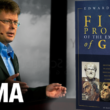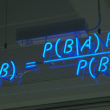How God’s Nature Is Known: The Three-Fold Way
by Dr. Dennis Bonnette
Filed under God's Nature, The Existence of God

Acceptance of God’s existence is conditioned for many on whether or not a convincing proof thereof can be presented to them. But for others, it is not a problem of proving that God exists, but rather questions about whether the concept of a Supreme Being is even coherent. Many atheists or agnostics simply find the classical conception of God to be unintelligible. God is said to be omnipotent, omniscient, eternal, all good, omnipresent, and so forth. But to many it is not at all... Read More
How Cosmic Existence Reveals God’s Reality
by Dr. Dennis Bonnette
Filed under Christianity and Science, The Existence of God

Gottfried Wilhelm Leibniz (1646-1716) famously posed the ultimate question: “Why is there something rather than nothing?” To this, theoretical physicist Sean Carroll replies: “The universe can simply exist, end of story.” Still, as I have shown elsewhere, everything must have a reason for its being or coming-to-be, including the cosmos. This metaphysical first principle is ably defended by others as well.1 One distinction must be added: either a thing is its own reason or... Read More
How “New Existence” Implies God
by Dr. Dennis Bonnette
Filed under The Existence of God

“Why new existence?” What kind of a question is that? Does it really mean anything? We know that motion or change is real and that everything in motion is moved by another. Moreover, a new paper defends the common sense Aristotelian understanding of motion and time while simultaneously definitively refuting certain misinterpretations of modern physics. But what does all that have to do with “new existence?” Let’s look at this from a different perspective. Being a finite or limited... Read More
Proofs for the Existence of God (#AMA with Dr. Edward Feser)
by Dr. Edward Feser
Filed under AMA, Atheism, The Existence of God

EDITOR'S NOTE: Dr. Edward Feser just released a new book, titled Five Proofs of the Existence of God (Ignatius Press, 2017). You probably know Dr. Feser from his sharply reasoned posts here at Strange Notions, or from his popular blog, which mainly focuses on the philosophy of religion. Dr. Feser has written several other excellent books, including: Neo-Scholastic Essays (St. Augustine's Press, 2015) Scholastic Metaphysics: A Contemporary Introduction (Scholastic Editions, 2014) The... Read More
Are Metaphysical First Principles Universally True?
by Dr. Dennis Bonnette
Filed under Philosophy, The Existence of God

Today, certain lines of attack against classical proofs for God’s existence, such as St. Thomas Aquinas’ Five Ways, seek to undermine foundational metaphysical first principles such as causality, sufficient reason, or even non-contradiction.1 Such attacks employ, for example, claims that (1) David Hume’s critique of causality is definitive, (2) the existence of the cosmos is simply a “brute fact,” needing no explanation, and (3) modern physics shows that the principle of non-contradiction... Read More
What would you ask a Catholic philosopher about God? (#AMA with Dr. Edward Feser)
by Brandon Vogt
Filed under AMA, The Existence of God

In a few days, Dr. Edward Feser will release his newest book, titled Five Proofs of the Existence of God (Ignatius Press, 2017). You probably know Dr. Feser from his sharply reasoned posts here at Strange Notions, or from his popular blog, which mainly focuses on the philosophy of religion. Dr. Feser is the author of several acclaimed books, including: Neo-Scholastic Essays (St. Augustine's Press, 2015) Scholastic Metaphysics: A Contemporary Introduction (Scholastic Editions, 2014) The... Read More
Does Conscience Point Towards the Existence of God?
by Matt Nelson
Filed under The Existence of God

Throughout the wide world of creation God has left all sorts of signs that point right back at him. Often these clues tell us more than that a divine being exists; they often tell us what kind of divine being exists. Some of these clues lie right before our nose in the world around us, whereas others lie deep inside of us at the level of immediate subjective experience. Among these interior signs is the conscience, which points not merely toward the existence of God but the existence of... Read More
Do Extraordinary Claims Require Extraordinary Evidence?
by Matt Nelson
Filed under The Existence of God

Too often people have a parrot-like propensity to be seduced by a catchy saying, hold to it, and assert it repeatedly without thinking seriously about what they’re saying. They remember before they speak, but they don’t think before they speak. And the most astonishing fact is that all too often they really do believe they have said something wise. Chesterton provided an example when he critiqued the popular exhortation to “believe in yourself” in his classic Orthodoxy. “Thoroughly... Read More
Sean Carroll’s “Ten Considerations” for Naturalists
by Brandon Vogt
Filed under The Existence of God

This is the final post in our long series exploring physicist Sean Carroll's new book, The Big Picture: On the Origins of Life, Meaning, and the Universe Itself (Dutton, 2016). In the book's penultimate chapter, which in my view is the book's strangest, Carroll offers an alternative to the Bible's Ten Commandments, what he calls his "Ten Considerations." They read like a mushy collection of Oprah-isms: Life isn't forever. Desire is built into life. What matters is what matters to people. We... Read More
The Power and Danger of Bayes’ Theorem
by Brandon Vogt
Filed under Christianity and Science, The Existence of God

I've noted many flaws and points of confusion in Sean Carroll's new book, The Big Picture: On the Origins of Life, Meaning, and the Universe Itself (Dutton, 2016), but one of the strongest sections is its explanation of Bayes' Theorem. The Theorem is a quantitive way to express confidence in certain beliefs. It requires assigning credences (or probabilities) to events or statements, and then tweaking them based on new information. For example, suppose you're wondering whether a randomly... Read More






